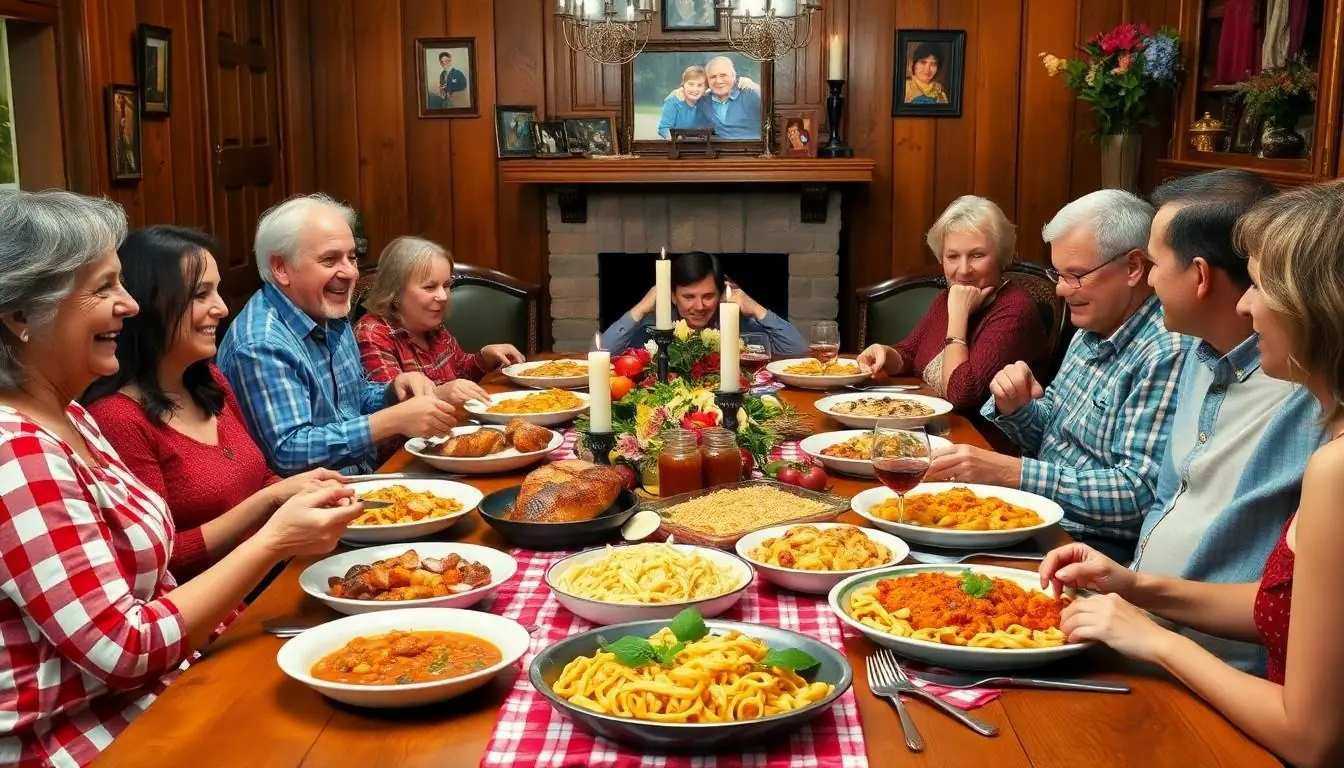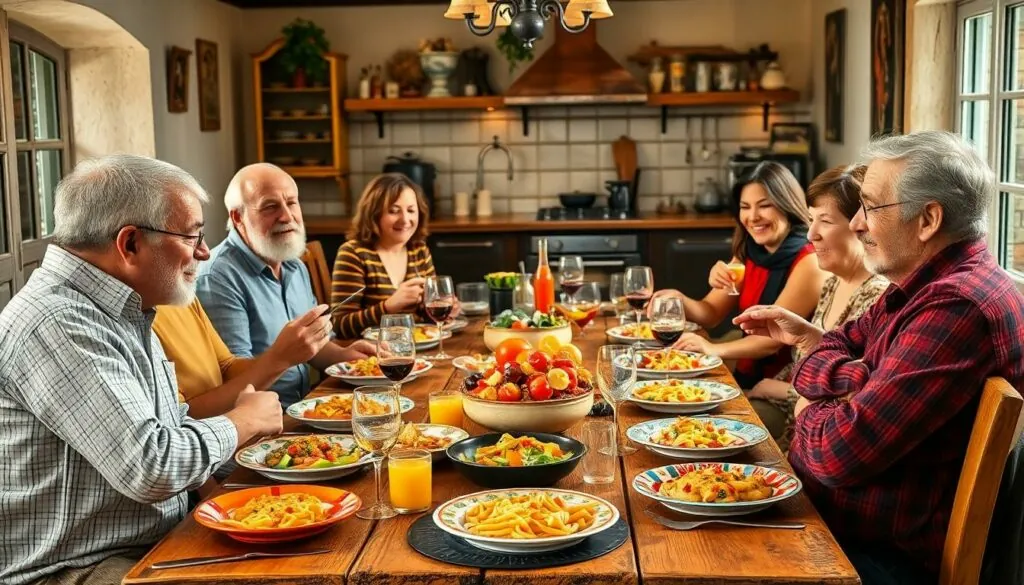Table of Contents
ToggleItalian family traditions are like a hearty bowl of pasta—rich, comforting, and full of flavor. From Sunday dinners that stretch into the night to lively gatherings where laughter echoes through the walls, these customs create bonds that are as strong as Nonna’s secret tomato sauce. Each tradition tells a story, blending generations of love, food, and a sprinkle of chaos.
Imagine a family feast where every dish has its own history, and every bite is a celebration of togetherness. Whether it’s the art of making fresh ravioli or the ritual of Sunday sauce, these traditions not only nourish the body but also feed the soul. Dive into the delightful world of Italian family traditions and discover how they keep the spirit of family alive, one delicious meal at a time.
Overview of Italian Family Traditions
Italian family traditions create a strong sense of identity and belonging. Celebrations often revolve around food, particularly Sunday dinners, which serve as an essential gathering point for relatives. Typically, families come together to enjoy homemade meals, enhancing their connections through shared experiences.
Central to many traditions is the preparation of traditional dishes, such as ravioli and sauces. Families pass down recipes through generations, ensuring that culinary techniques and flavors persist. Ritualistic elements often emerge during these cooking sessions, promoting collaboration and storytelling among family members.
Holidays amplify the significance of family gatherings in Italy. Christmas and Easter feature elaborate meals, emphasizing both religious traditions and family connections. During these occasions, it’s common to see multiple generations participating in rituals, fostering unity and a sense of heritage.
Respect for elders distinctly marks Italian family life. Children often listen to the stories and wisdom shared by grandparents, reinforcing family values. This respect cultivates a supportive environment where everyone contributes to the family’s legacy.
Celebrations also include special toasts and blessings, reflecting the ingrained customs in Italian culture. Each toast embodies heartfelt wishes, creating an atmosphere of warmth and affection. Both everyday meals and festive gatherings highlight the priority of family in Italian upbringing.
Overall, Italian family traditions embody a blend of culinary practices, generational respect, and heartfelt gatherings. Families build their identity around these practices, ensuring that love and unity thrived in the heart of Italian culture.
Importance of Family in Italian Culture

Family holds a central role in Italian culture, shaping identity and daily life. The bonds formed within families often extend beyond immediate members, emphasizing collective support and shared values.
The Role of Extended Family
Extended family plays a vital role within Italian households. Grandparents, aunts, uncles, and cousins contribute to nurturing children’s development and preserving cultural traditions. Close-knit relationships foster a sense of security and belonging. These connections often lead to shared responsibilities, whether in caregiving or during family projects, integrating everyone into the family structure. Regular interactions strengthen ties among generations, allowing elders to pass down wisdom and life lessons, while younger members bring fresh perspectives, ensuring the family evolves yet retains its roots.
Family Gatherings and Celebrations
Family gatherings and celebrations often embody Italian culture’s essence. Sunday dinners stand out as pivotal occasions for everyone to unite, often featuring traditional dishes that honor family heritage. Celebrating holidays like Christmas and Easter involves preparing elaborate meals that reflect both culinary skills and familial bonds. Special occasions encourage lively conversations, laughter, and storytelling, weaving memories into the fabric of Italian family life. Each celebration comes with its own unique customs, whether through toasts or blessings, strengthening unity and affection among family members.
Italian Family Traditions Through the Seasons
Italian family traditions vary beautifully with the seasons, highlighting the importance of family gatherings throughout the year.
Summer Traditions
Summer in Italy brings vibrant family picnics. Families often gather in parks or beautiful countryside to enjoy homemade dishes. Grilled meats, fresh salads, and regional specialties appear on tables, evoking flavors of Italian cuisine. Festivals celebrating local produce attract family members of all ages. While children play, adults share stories and traditions, reinforcing bonds. Outdoor feasts become a backdrop for lively conversations and laughter, showcasing the importance of unity in Italian culture.
Winter Traditions
Winter traditions offer a warm embrace during colder months. Families celebrate Christmas with feasts that last for hours. Special dishes like roast lamb and panettone grace dining tables, inviting relatives to gather closely. The tradition of sharing a midnight meal on Christmas Eve brings everyone together. New Year’s festivities highlight family connections through customs such as sharing lentils for prosperity. While winter nights are chilly, family gatherings provide warmth, laughter, and cherished memories, emphasizing the value of togetherness in Italian life.
Traditional Italian Family Meals
Traditional meals in Italian families nurture connections. Food plays a vital role, creating memories and fostering togetherness.
Sunday Dinners
Sunday dinners unite families around the dining table. These gatherings often feature multiple courses, starting with antipasti and finishing with dessert. Each dish tells a story, from homemade pasta to slow-cooked ragù, capturing generations of culinary heritage. Family recipes are cherished and passed down, encouraging values of sharing and love. Each person’s contribution enhances the meal’s significance, making these evenings special. Laughter and conversation flow freely, reinforcing bonds among relatives. Sunday dinners embody the spirit of Italian culture, reminding everyone of the importance of family.
Holiday Feasts
Holiday feasts celebrate both tradition and togetherness. During Christmas and Easter, families prepare elaborate meals filled with unique dishes. Roast lamb and panettone highlight Christmas tables, while Easter features colorful pastas and special desserts. These occasions draw multiple generations together, reinforcing ties and shared experiences. Each feast fosters a sense of unity and belonging, with elders sharing stories and recipes. Traditions like a midnight meal on Christmas Eve deepen the sense of festivity. Every holiday meal becomes an occasion to connect with the past while creating new memories for the future.
The Influence of Italian Family Traditions on Modern Life
Italian family traditions significantly shape modern life, keeping cultural legacies alive. These customs surround family dynamics, fostering unity and connection across generations.
Preserving Traditions in a Changing World
Families actively work to maintain Italian traditions despite societal changes. Grandparents often teach younger generations essential recipes, emphasizing the story behind each dish. Sunday dinners remain a staple, inviting family members to bond over shared meals. Many families incorporate these customs into daily routines, dedicating time to preserve their heritage. Celebrations reflect the continuity of cultural practices, ensuring they thrive amid modernization.
Integrating New Customs
New traditions blend seamlessly with Italian customs, enriching family life. Mixed marriages or relocation introduce multicultural elements that families eagerly embrace. Integrating international dishes into holiday meals showcases culinary diversity while retaining Italian flavors. The importance of digital communication enhances connections with family members living abroad. Modern events may include traditional elements, ensuring celebrations evolve while respecting their roots.
Italian family traditions serve as a vibrant tapestry that weaves together generations. They embody the essence of love and connection through shared meals and cherished rituals. As families gather around the table, they create lasting memories that honor their heritage while embracing modern influences.
These traditions not only nurture relationships but also instill a sense of identity and belonging. By celebrating the past and looking toward the future, Italian families ensure that their cultural legacy remains alive and thriving. The warmth of these gatherings continues to inspire unity and togetherness, making Italian family traditions a cornerstone of their rich cultural landscape.







